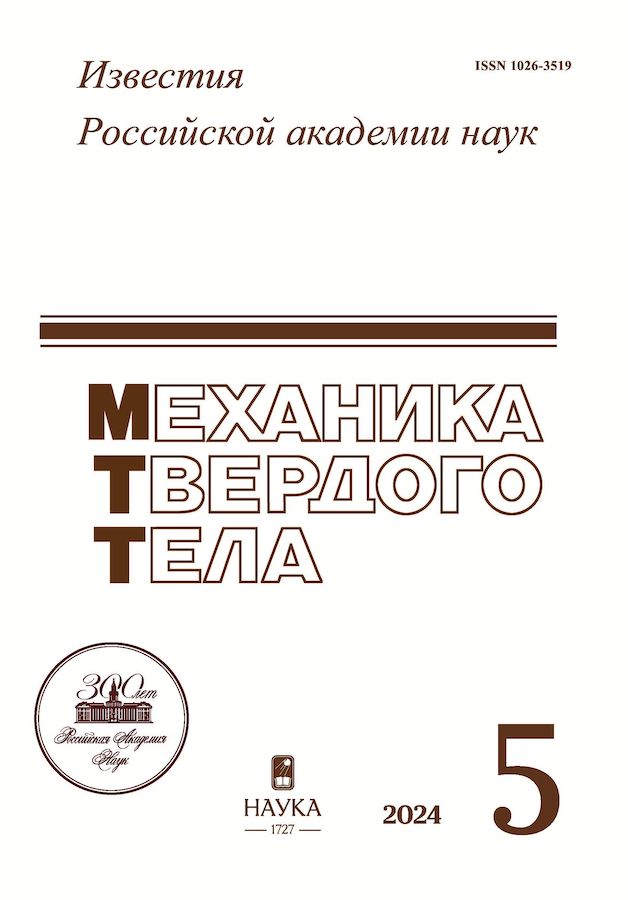On the influence of a non-classical diffusion process on the long-term fracture of a composite tensile rod during creep
- Авторлар: Fomin L.V.1, Dalinkevich A.A.1,2, Basalov Y.G.1
-
Мекемелер:
- Research Institute of mechanics of Lomonosov Moscow State University
- Frumkin Institute of Physical Chemistry and Electrochemistry, Russian Academy of Sciences
- Шығарылым: № 5 (2024)
- Беттер: 122–137
- Бөлім: Articles
- URL: https://kazanmedjournal.ru/1026-3519/article/view/672973
- DOI: https://doi.org/10.31857/S1026351924050088
- EDN: https://elibrary.ru/UAQGWB
- ID: 672973
Дәйексөз келтіру
Аннотация
The stress-strain state is considered and the time to fracture of a composite tensile rod during creep in an active medium is determined. The influence of the active medium is determined by a non-classical diffusion process, with the active substance penetrating into the material in two states: free and bound. The process of such diffusion is described by a modified diffusion equation that takes into account the two-phase state of the active substance in the material. A system of equations has been obtained that models the creep of a composite rod, in which its parts are rigidly connected to each other without slipping, and also includes kinetic equations for the accumulation of damage in parts of the rod. The influence of the active medium is taken into account by introducing into the indicated kinetic equations the function of the influence of the active medium - a function of the integral average concentration. Stress distributions and damage accumulation processes over time in various parts of the composite rod are analyzed. Calculations were carried out in two cases, namely, classical and non-classical diffusion processes are considered. The setting of these differences is determined by the choice of appropriate parameters in the diffusion model under consideration. Dependences of damage accumulation and stress distribution in parts of the rod over time were obtained. As a result, it was determined that the destruction of a composite rod in the classical case occurs earlier than in the case of the considered non-classical diffusion process.
Толық мәтін
Авторлар туралы
L. Fomin
Research Institute of mechanics of Lomonosov Moscow State University
Хат алмасуға жауапты Автор.
Email: fleonid1975@mail.ru
Ресей, Moscow
A. Dalinkevich
Research Institute of mechanics of Lomonosov Moscow State University; Frumkin Institute of Physical Chemistry and Electrochemistry, Russian Academy of Sciences
Email: dalinckevich@yandex.ru
Ресей, Moscow; Moscow
Yu. Basalov
Research Institute of mechanics of Lomonosov Moscow State University
Email: basalov@yandex.ru
Ресей, Moscow
Әдебиет тізімі
- Rabotnov Yu.N. Creep of structural elements. Moscow: Nauka, 1966. 752 p.
- Lokoshchenko A.M. Creep and long-term strength of metals. Moscow: Fizmatlit, 2016. 504 p. (in Russian) = Lokoshchenko A.M. Creep and Long-Term Strength of Metals. CISP. CRC Press. Taylor & Francis Group. Boca. Raton. London. New York. 2017. 546 p. https://doi.org/10.1201/b22242.
- Alexander Lokoshchenko and Leonid Fomin. Kinetic Theory of Creep and Long-Term Strength of Metals, in Kinetic Theory, George Z. Kyzas and Athanasios C. Mitropoulos, IntechOpen, (December 20th 2017). https://doi.org/10.5772/intechopen.70768.
- Fomin L.V., Basalov Yu.G. On the long-term fracture of a composite tensile rod under creep conditions // Bulletin of the Russian Academy of Sciences. Mechanics of Solids. 2023, No. 1. P. 28–40. (in Russian)
- Lokoshchenko A.M., Fomin L.V. Delayed fracture of plates under creep condition in unsteady complex stress state in the presence of aggressive medium // Applied Mathematical Modelling. 2018. Vol. 60. P. 478−489. https://doi.org/10.1016/j.apm.2018.03.031.
- Weinberg A.M., Wigner E.P. The physical theory of neutron chain reactors, Chapter VIII, The University of Chicago Press. 1958.
- Chuvildeev V.N., Smirnova E.S. Phenomenological theory of volume diffusion // Physics of the Solid State. 2016. Vol. 58. Issue. 7. Pp. 1436–1447. (in Russian).
- Kofstad P. Deviation from stoichiometry, diffusion, and electrical conductivity in porous metal oxides / Translation from English edited by N.N. Semenov. Moscow: Mir. 1975. 398 p. (in Russian)
- Harris G. Carter, Kenneth G. Kibler. Langmuir-tipe model for anomalous moisture diffusion in composite resins // J. Composite Materials. 1978. Vol. 12. P. 118–131.
- Lavrentiev M.A., Shabat B.V. Methods of the Theory of Functions of a Complex Variable. Moscow: Main Editorial Board of Physical and Mathematical Literature, Nauka Publishing House, 1973, 736 p. (in Russian)
- Fomin L.V. Description of the Long-Term Strength of Tensile Rods of Rectangular and Circular Cross-Sections in a High-Temperature Air Medium // Bulletin of the Samara State Tech. University. Series: Phys. and Mathematics. Sciences. 2013. No. 3 (32). P. 87–97. (in Russian) https://doi.org/10.14498/vsgtu1228
- Oding I.A., Friedman Z.G. The Role of Surface Layers in Long-Term Fracture of Metals under Creep Conditions // Plant. Lab. 1959. 25:3. P. 329–332. (in Russian)
Қосымша файлдар















